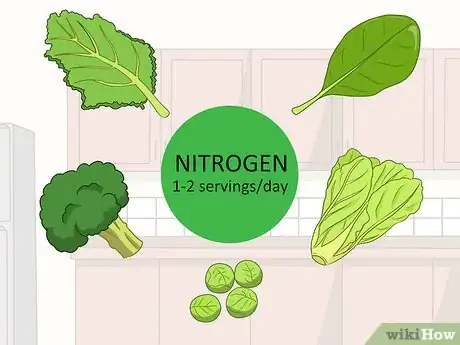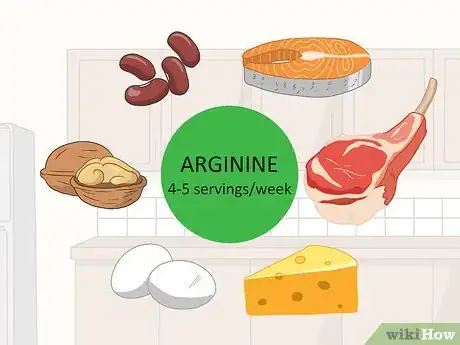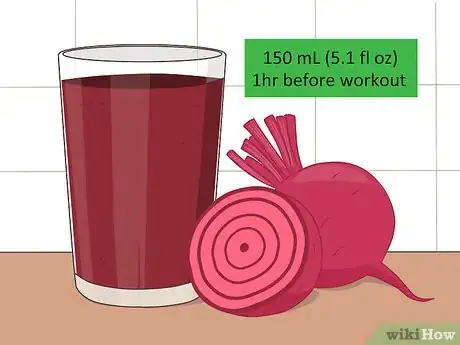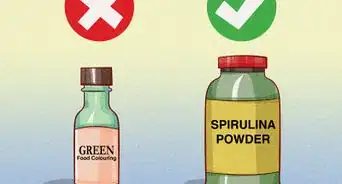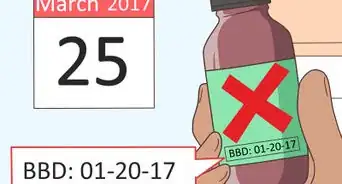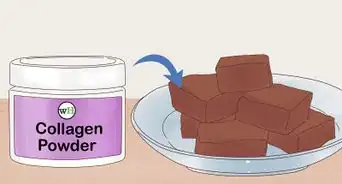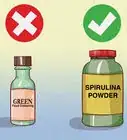This article was co-authored by Adrienne Youdim, MD. Dr. Adrienne Youdim is a Board Certified Internist specializing in medical weight loss and nutrition and founder and creator of Dehl Nutrition - a line of functional nutritional bars and supplements. With 10+ years of experience, Dr. Youdim uses a holistic approach to nutrition that blends lifestyle changes and evidence-based medicine. Dr. Youdim holds a BA from the University of California, Los Angeles (UCLA) and an MD from the University of California, San Diego (UCSD). She completed her residency training and fellowship at Cedars-Sinai. Dr. Youdim holds multiple board certifications awarded by the American Board of Internal Medicine, the National Board of Physician Nutrition Specialists, and the American Board of Obesity Medicine. She is also a Fellow of the American College of Physicians. Dr. Youdim is an Associate Professor of Medicine at UCLA David Geffen School of Medicine and an Assistant Professor of Medicine at Cedars-Sinai Medical Center. She has been featured on CBS News, Fox News, Dr. Oz, National Public Radio, W Magazine, and the Los Angeles Times.
There are 8 references cited in this article, which can be found at the bottom of the page.
This article has been viewed 22,801 times.
Nitric oxide is an element produced in your body that helps to lower blood pressure, improve circulation, and increase energy.[1] As you age, your nitric oxide levels are depleted and should be supplemented. You can boost your nitric oxide levels by doing regular cardiovascular exercise, getting outdoors, and meditating. These levels can also be raised if you eat healthy foods like greens and protein. Many supplements are available to boost you nitric oxide levels, but they should only be taken with your doctor's approval.
Steps
Getting Active
-
1Do at least 30 minutes of cardio every day. Cardiovascular exercise makes your heart pump faster, which triggers the production of nitric oxide in your body. Try to do sessions of moderate to intense cardio that last at least 30 minutes, or break up the 30 minutes into activities that are at least 10 minutes long. Plan activities such as running, biking, swimming, dancing, rollerblading, or aerobics.
- Brisk walks are also a good form of exercise, and can easily be combined with daily activities like walking your dog or running errands.
- Fit workouts into your busy schedule by waking up early to exercise or exercising during your lunch break.
-
2Spend at least 20 minutes outdoors each day. Getting UV exposure allows your body to unlock its own stores of nitric oxide, raising your overall levels. Take the time to sit or walk around outdoors at least 20 minutes a day. This will also help reduce your blood pressure and improve your mood.[2]
- Apply SPF to protect your skin from UVA damage.
Advertisement -
3Meditate to help open up your blood vessels. Meditation aims to relax the body, which can lower your blood pressure. This relaxed state can improve your body's production of nitric oxide. Aim to practice meditation at least once or twice a week to promote a healthier body and mind.[3]
Consuming the Right Nutrients
-
1Eat leafy greens and other vegetables that contain nitrogen. As a general rule, dark green vegetables are rich in nitrogen, an element that which produces nitric oxide when metabolized in the body. Aim to eat at least 1-2 servings of these foods a day to keep up your nitric oxide levels. These vegetables include:[4]
- Kale
- Spinach
- Lettuce
- Brussel sprouts
- Broccoli
-
2Eat protein-rich foods high in arginine. Nitric oxide is produced when the body breaks down arginine. This amino acid is found in most high-protein foods. Try to eat 4-5 servings per week of foods like:
- Fish (e.g. salmon, swordfish)
- Meats (e.g. lamb, beef)
- Cheese
- Eggs
- Nuts
- Legumes
- Beans
-
3Drink beet juice for an increase in nitric oxide. Beet juice can increase your levels of nitric oxide significantly before a workout. Drink at least 150 millilitres (5.1 fl oz) of it an hour before working out, or regularly during the week to raise your levels consistently. To mix things up, add beet juice to smoothies or mix it with other juices for a variety of flavors. [5]
- Berries have the sweetness and tartness to hide the taste of beets when mixed with them.
-
4Eat dark chocolate to ease your body's production of nitric oxide. Dark chocolate contains polyphenols, which can help to ease your oxidative stress. In turn, it can promote the body's production of nitric oxide. A few times a week, eat 3-4 squares of chocolate containing at least 85% cocoa.[6]
- This should amount to 40 grams (1.4 oz) of chocolate.
- Swap milk chocolate or candy for dark chocolate as a snack or small dessert.
-
5Ask your doctor about nitrosigine supplements. Nitrosigine supplements are used by some body builders to increase their nitric oxide levels and boost their energy during hard workouts. The increased blood flow created by nitric oxide helps with muscle growth and recovery. Ask your doctor if nitrosigine supplements would be a viable choice for you. [7]
- Do not take nitrosigine without first discussing the potential risks with your doctor.
Expert Q&A
Did you know you can get expert answers for this article?
Unlock expert answers by supporting wikiHow
-
QuestionWhat foods are high in nitric oxide?
 Adrienne Youdim, MDDr. Adrienne Youdim is a Board Certified Internist specializing in medical weight loss and nutrition and founder and creator of Dehl Nutrition - a line of functional nutritional bars and supplements. With 10+ years of experience, Dr. Youdim uses a holistic approach to nutrition that blends lifestyle changes and evidence-based medicine. Dr. Youdim holds a BA from the University of California, Los Angeles (UCLA) and an MD from the University of California, San Diego (UCSD). She completed her residency training and fellowship at Cedars-Sinai. Dr. Youdim holds multiple board certifications awarded by the American Board of Internal Medicine, the National Board of Physician Nutrition Specialists, and the American Board of Obesity Medicine. She is also a Fellow of the American College of Physicians. Dr. Youdim is an Associate Professor of Medicine at UCLA David Geffen School of Medicine and an Assistant Professor of Medicine at Cedars-Sinai Medical Center. She has been featured on CBS News, Fox News, Dr. Oz, National Public Radio, W Magazine, and the Los Angeles Times.
Adrienne Youdim, MDDr. Adrienne Youdim is a Board Certified Internist specializing in medical weight loss and nutrition and founder and creator of Dehl Nutrition - a line of functional nutritional bars and supplements. With 10+ years of experience, Dr. Youdim uses a holistic approach to nutrition that blends lifestyle changes and evidence-based medicine. Dr. Youdim holds a BA from the University of California, Los Angeles (UCLA) and an MD from the University of California, San Diego (UCSD). She completed her residency training and fellowship at Cedars-Sinai. Dr. Youdim holds multiple board certifications awarded by the American Board of Internal Medicine, the National Board of Physician Nutrition Specialists, and the American Board of Obesity Medicine. She is also a Fellow of the American College of Physicians. Dr. Youdim is an Associate Professor of Medicine at UCLA David Geffen School of Medicine and an Assistant Professor of Medicine at Cedars-Sinai Medical Center. She has been featured on CBS News, Fox News, Dr. Oz, National Public Radio, W Magazine, and the Los Angeles Times.
Board Certified Internist
Warnings
- Avoid animal nitrates, which are found in processed meats and linked to increased cancer risk.⧼thumbs_response⧽
- Eating beets may turn your urine pink or red, but is not harmful.[9]⧼thumbs_response⧽
References
- ↑ Adrienne Youdim, MD. Board Certified Internist. Expert Interview. 11 September 2020.
- ↑ https://www.sciencedaily.com/releases/2014/01/140117090139.htm
- ↑ https://www.npr.org/sections/thesalt/2014/07/02/327775106/how-dark-chocolate-not-milk-chocolate-may-help-blood-flow
- ↑ https://www.cnn.com/2017/02/14/health/food-sex-performance-libido-drayer/index.html
- ↑ https://www.ncbi.nlm.nih.gov/pmc/articles/PMC5295087/
- ↑ https://www.npr.org/sections/thesalt/2014/07/02/327775106/how-dark-chocolate-not-milk-chocolate-may-help-blood-flow
- ↑ https://www.mensjournal.com/food-drink/6-things-you-need-know-about-nitrosigine/
- ↑ https://academic.oup.com/cardiovascres/article/43/3/658/321047
- ↑ https://www.health.harvard.edu/press_releases/color-odor-changes-in-urine-usually-but-not-always-harmless




